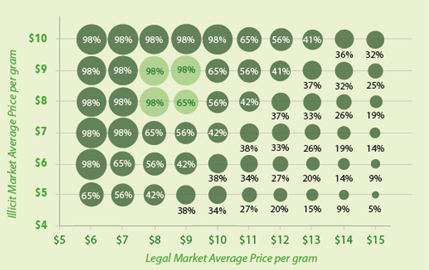A report published today by the country’s Parliamentary Budget Officer warned that the government isn’t likely to see a huge increase from taxes on legalized cannabis as soon as it’s made legal.

In the report, titled Legalized Cannabis: Fiscal Considerations, Jean-Denis Fréchette wrote that cannabis will introduce an entirely new sector into the formal economy when legalized sales begin as early as January 2018, but that governments won’t be able to heavily tax.
“The government may have little fiscal space to apply tax without pushing the price of legal cannabis significantly above the illegal market price,” Fréchette wrote. “Even with only a sales tax, legal cannabis prices in 2018 will likely be as high as illicit market prices in 2015-16. Excise taxes will likely push the legal price above the illicit price observed in 2015-16.”
As a result, revenues from retail sales of cannabis are projected to be in the hundreds of millions, not billions, with around 60 per cent of sales tax revenues going to provincial governments, and the remainder to the federal government.
The report warns the government that it must maintain comparable prices to black market cannabis to discourage customers from using other means of purchase.

“Tax policy decisions will involve trade-offs between two of the federal government’s goals: discouraging consumption among young Canadians and reducing the profits in the illicit cannabis market,” the report states. ”
“On one hand, higher cannabis prices discourage consumption, especially among young Canadians who are likely to be more sensitive to price. Prices must be higher in both the legal and illicit markets if they are to effectively discourage consumption.
“On the other hand, higher legal cannabis prices provide a disincentive for current users to transfer to the legal market. The higher the premium for legal cannabis over the illicit price, the more Canadians will purchase cannabis on the illicit market.”
The Parliamentary Budget Officer projects that as the legal market grows, governments will likely be able to increase taxes and revenues from cannabis.

“Production costs for the legal industry are expected to decline, creating space for government to collect a portion of the cost savings without increasing the legal retail price,” the report stated. “Further, a potential consumer shift to more value-added cannabis products could create a larger tax base. Finally, as the legal market becomes more entrenched, more Canadians may opt into the legal market, resulting in higher revenues.”
The PBO’s office estimated that in 2018 4.6 million Canadians over 15 will use cannabis at least once, rising to 5.2 million by 2021.
“In 2018, Canadians aged 15 and over will consume an estimated 655 metric tons of cannabis; by 2021, this could rise to 734 metric tons. The vast majority of total demand – 98 per cent – would come from the 41 per cent of users who consume ‘at least once a week’ or ‘daily.’”



